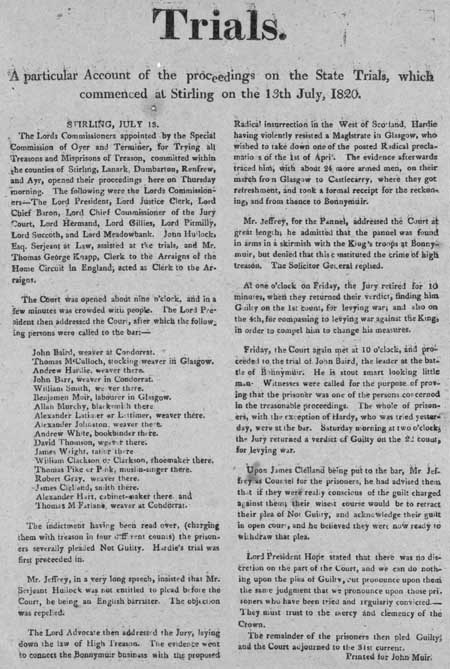Transcription
Trials. A particular Account of the proceedings on the State Trials, which
commenced at Stirling on the 13th July, 1820. STIRLING, JULY 13. Radical insurrection in the West of Scotland, Hardie
The Lords Commissioners appointed by the Special having violently resisted a Magistrate in Glasgow, who
Commission of Oyer and Terminer, For Trying all wished to take down one of the posted Radical procla-
Treasons and Misprisons of Treason, committed within matio s of the 1st of April. The evidence afterwards
the counties of Stirling, Lanark, Dumbarton, Renfrew, traced him, with about 24. more armed men, on their
and Ayr, opened their proceedings here on Thursday march from Glasgow to Castlecarry, where they got
morning. The following were the Lords Commission- refreshment, and took a formal receipt for the reckon-
ers?The Lord President, Lord justice Clerk, Lord ing, arid from thence to Bonnymuir.
Chief Baron, Lord Chief Commissioner of the Jury
Court, Lord Hermand, Lord Gillies, Lord Pitmilly, Mr. Jeffrey, for the Pannel, addressed the Court at
Lord Succoth, and Lord Meadowbank. John Hullock, great length; he admitted that the pannel was found
Esq. Serjeant at Law, assisted at the trials, and Mr. in arms in a skirmish with the King's troops at Bonny-
Thomas George Knapp, Clerk to this Arraigns of the muir, but denied that this constituted the crimeof high
Home Circuit In England, acted as Clerk to the Ar- treason. The Solicitor General replied.
At one o'clock on Friday, the Jury retired for 10 The Court was opened about nine o'clock, and in a minutes, when they returned their verdict, finding him
few minutes was crowded with people. The Lord Pre- Guilty on the 1st count, for levying war; and also on
sident then addressed the Cour, after which the follow; the 4th, for compassing to levying war against the King
ing persons were called to the bar:? in order to compel him to change his measures. John Baird, weaver at Condorrat. . Friday, the Court again met at 10 o'clock, and pro-
Thomas M'Calloch, stocking-weaver in Glasgow. ceeded to the trial of Join Baird, the leader at the bat
Andrew Hardie, weaver there tle of Bonnymuir. He is stout smart looking little
John Barr, weaver in Condorrat. man Witnesses were called for the purpose of prov-
William Smith, we ver there. ing that the prisoner was one of the persons concernod
Benjamen Moir, labourer in Glasgow. in the treasonable proceedings. The whole of prison-
Allan Murchy, blacksmith there ers, with the exception of Hardy, who was tried yester
Alexander Latier or Latimer, weaver there. day, were at the bar. Saturday morning at two o'clock,
Alexander Johnston_ weaver there. the jury returned a verdict of Guilty on a 2nd couut,
Andrew White, bookbinder there. for levying war.,
David Thomson, weaver there;
James Wright, tailor there
William Clackson or Clarkson, shoemaker there,
Thomas Pike or Ponk, muslin-singer there.
Robert Gray, weaver there. Upon James Clelland being put to the bar, Mr Jef-
James Cleland, smith there. frey as counsel for the prisoners, he had advised them
Alexander Hart, cabinet-maker there, and that if they were really conscious of the guilt charged
Thomas M Fatlane, weaver at Condorrat. against them; their wisest course would be to retract
their plea of Not Guiuy, and acknowledge their guilt
The indictment having been read over, (charging in open cour, and he believed thty were now ready to
them with treason in four diffrent counts) the prison- Withdraw that plea.
ers severally pleaded Not Guilty. Hardie's trial was
first proceeded in. Lord President Hope stated that there was no dis-
cretion on the part of the Court, and we can do noth-
Mr. Jeffrey, in a very long speech, insisted that Mr. ing upon the plea of Guilty, cut pronounce upon them
Serjeant Hullock was not entitled to plead before the the same judgment that we pronounce upon those pri.
Court, he being an English barrister. The objection coners who have been tried and regularly convicted.
was repelled. They must trust to the mercy and clemency of the
Crown. The Lord Advocate then addressed the Jury, laying The remainder of the prisoners then pled Guilty'
down the law of High Treason. The evidence went and the Court adjourned to the 31st current.
to connect the Bonnymuir business with the proposed Printed for John' Muir.
View Commentary | Download PDF Facsimile
|
 |
Date of publication:
1820 shelfmark: L.C.Fol.73(008)
 View larger image
View larger image
|


